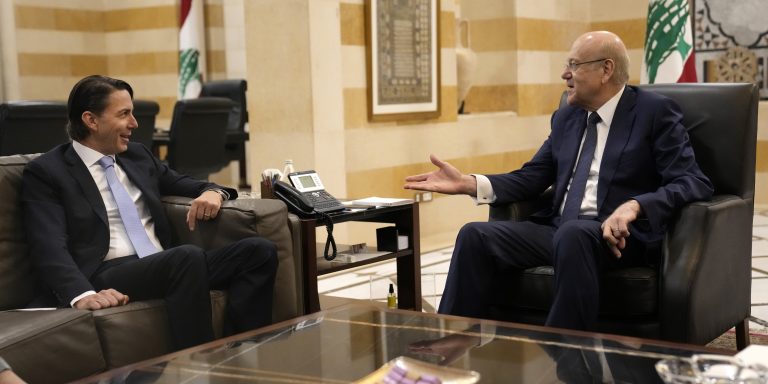INTELBRIEF
June 21, 2022
IntelBrief: Israel-Lebanon Dispute Clouds Mediterranean Gas Development

Bottom Line Up Front
- The United States is mediating a longstanding maritime border dispute between Israel and Lebanon, in order to accelerate the development of natural gas in the eastern Mediterranean.
- Resolving the Israel-Lebanon maritime border dispute has assumed new urgency in the context of Russia’s invasion of Ukraine.
- Israel seeks to position itself as a supplier of natural gas to European Union countries as the EU tries to reduce its dependence on Russian energy.
- Lebanese Hezbollah has sought to re-energize its role as an anti-Israeli movement by threatening Israeli offshore development efforts, increasing the risk of cross-border violence.
In mid-June, U.S. officials resumed their long-stalled efforts to mediate an agreement on the maritime border between Israel and Lebanon, as part of a broader campaign to accelerate the development of natural gas resources in the eastern Mediterranean. The dispute dates back to the 1948 U.N. recognition of Israeli independence and is one of many such disagreements that exist between Israel and its Arab neighbors. The two countries have officially been at war since Israel’s independence and periodic cross-border violence remains a concern for regional stability and development. Over the past 15 years, based on assessments that fields off Israel’s coast could hold 34.5 trillion cubic meters of gas, Israel has proceeded to develop natural gas reserves off its coast, some of which are claimed by Lebanon. Since 2010, when Lebanon submitted its claim for a southern maritime boundary with Israel to the United Nations, a succession of U.S. mediators have sought to negotiate a Lebanon - Israel maritime border agreement that would allow both countries to proceed with offshore gas development.
The latest phase of mediation, led by U.S. State Department special envoy for energy, Amos Hochstein, began in February 2022 but quickly stalled amid disagreements between Lebanese leaders. The differences, aggravated by competition in the March 15 national elections, centered on whether to accept U.S. proposals that would require Lebanon to reduce its offshore claims. The United States included in its offer the incentive that Lebanon could start receiving Israeli gas soon after a maritime border agreement was struck - alleviating the problem of the long lead time required for Lebanon to develop its offshore gas fields. The Israeli gas provisions would help ease Lebanon’s severe financial and economic crisis- a significant source of which has been a shortage of fuel that has driven up prices beyond the means of most Lebanese citizens.
Earlier this month, in an apparent attempt to put pressure on Lebanese leaders, Israel began construction of a natural gas rig in the offshore Karish gas field. Israel claims that the field is part of its U.N.-recognized exclusive economic zone, but Lebanon has long insisted it is in a disputed area. The pressure tactic appears to have worked, at least in the short-term. In mid-June, President Michel Aoun invited Hochstein to Beirut to present the government’s consolidated position, and the U.S. envoy subsequently stated that the Lebanese proposals “will enable the negotiations to go forward.” He added that: “I heard a clear understanding that the economic crisis in Lebanon that is closely tied with the energy crisis needs to be solved and resolving the maritime dispute is a critical step to resolving the economic crisis." Yet, no date has been set for Hochstein to meet with Israeli officials, who have questioned Lebanese commitment to the concessions. Asserting their maximalist position, Israeli officials added that they would not halt drilling in the Karish gas field. Still, U.S. officials are expected to push for an accord as part of a broader effort not only to ease Lebanon’s economic crisis but also to increase development of gas resources in the eastern Mediterranean more generally. Gas from the region is crucial for Europe, which is scrambling to find substitutes for Russian gas supplies. The European effort took a step forward on June 15 with the EU’s signing of an accord with Israel and Egypt which will enable Israel to export natural gas to Europe by way of existing Egyptian pipelines and liquefaction plants.
The U.S. effort to mediate the Lebanon-Israel maritime border also addresses the strategic objective of limiting the potential for further conflict in the region. Lebanese Hezbollah has identified Israeli offshore development as an opportunity to burnish its credentials as a resistance movement and to mitigate damage the party suffered in the Lebanese parliamentary election in March. On June 9, Hezbollah’s secretary-general Hassan Nasrallah said the party would not stand idle “before the looting of Lebanon’s wealth. The Resistance has the technical ability to prevent the enemy from extracting gas from Karish and I will not say how.” Although Hezbollah’s saber-rattling has not escalated beyond verbal threats, Nasrallah’s comments highlight Hezbollah’s ability to play spoiler and the potential for renewed cross-border hostilities. Having lost its parliamentary majority in March, Hezbollah has little to lose if the negotiations are derailed and Lebanon’s economic woes continue to worsen. A Hezbollah-Israel clash also has the potential to cause Iran and Israel to escalate their low-level, covert war against each other - an outcome that would not only cause civilian casualties but also worsen global economic difficulties. U.S. officials are likely to intensify their mediation efforts on the Israel-Lebanon maritime border in order to address the multitude of threats posed by continued dispute.